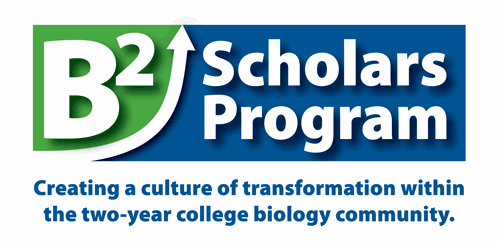B2 Scholars: Creating a culture of transformation within the two year college biology community
B2 Program General Information
The B2 program is designed to address the challenges of teaching science at community colleges, including the high proportion of part time faculty and a diverse range of student preparation, experience and goals. In addition to classroom issues, student success is confounded by many extra-curricular issues such as finances, family pressures, and balancing work and studies. There is a great deal of pressure on CCs to increase retention rates while serving a broad range of students, many of whom follow a “churning” path through higher education, picking up classes at different institutions, “stopping out” for periods, filling in gaps in degree or certification programs. Addressing issues that impact the success of at risk students, such as underrepresented minorities and first generation students, typically has a universal effect and increases the success of all students. Finding effective ways to teach all the students in class is a daunting task, exacerbated by the inherent isolation of teaching.
While CC science faculty are committed to student success, they are often unaware of resources that can support this goal. These resources include education research on effective pedagogical methods, quality educational materials, current disciplinary practices, student support services programs on campus, and institutional administrative challenges and goals. Student success in the science classroom can be enhanced by increasing faculty awareness of, and ability engage with, resources and methods shown to impact student success.
The B2 Program is a community of transformation that is designed to raise awareness of resources and engage peers in sharing experiences using these resources. The program consists of professional development in current pedagogical methods since few higher education faculty receive more than cursory, generalized professional development around teaching. A key component of this professional development is interactions with peers within their department and institution, and importantly, beyond their institution. Research indicates that implementation of reform efforts is fraught with challenges and participation in a community of peers can alleviate some of the stress and promote full adoption of new practices. Identification with a community of practice can also lead to a more scholarly approach to teaching which embraces continuous improvement, generates publicly available resources and shares outcomes formally and informally. NABT and BioQUEST will provide communities of practice and transformation for the B2 participants.
Faculty will also be encouraged to reconnect with their disciplinary community. Vision and Change exhorts biologists to teach the science we do, but many teaching focused faculty drift away from their discipline due to time constraints. However, biology changes extremely rapidly and faculty who do not follow the field are rapidly left behind in terms of content and practice. This information is critical to preparing the future workforce. With the growing interest in undergraduate research experiences, faculty have more reason than ever to stay current with their science practice.
An advisory board composed of leaders in professional development for STEM faculty and leaders in the CC world, content mentors with expertise in pedagogy, institutional change and grant writing, and team facilitators from CCs will work with the BioQUEST staff to maintain an effective two year program that leads to continuous improvement in student success in science courses.
Questions about the B2 Scholars Program? Contact Dan Ward, program director at: dan.ward"at"bioquest.org
